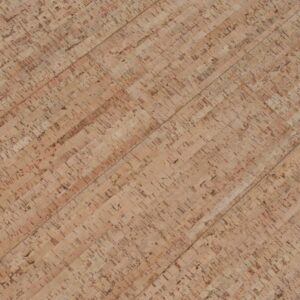When considering cork flooring, the most common question is whether it can withstand the wear and tear of daily use. The answer is yes – cork flooring is just as durable as other options.
Cork is known for its impressive durability and excellent insulating properties for heat, sound, and moisture. The bark of the cork oak tree has a unique cellular structure, with 90% of it being air. This structure contains about 40 million cells per cubic centimeter, offering resilience and insulation. Cork’s ability to compress and return to its original shape makes it an incredibly forgiving and long-lasting flooring material.
In addition to its durability, cork flooring is very comfortable. The air trapped in its cellular structure provides natural support, making it ideal for spaces where you’ll be standing or walking for long periods. Cork also contains a natural compound called Suberin, which repels insects and mold. It is also fire-resistant. Rest assured, Suberin is completely safe for both children and pets.
Cork flooring also boasts significant environmental benefits. It is considered an eco-friendly option because cork is a renewable resource. Unlike other materials, harvesting cork from cork oak trees does not harm the tree. The bark is carefully removed without damaging the tree itself, and the tree can be harvested every 9 to 12 years for its entire lifespan, which lasts over 200 years. Most cork comes from Portugal, which produces more than 70% of the world’s supply. Once harvested, the bark is ground up, combined with non-toxic resin, and baked into sheets, creating the beautiful cork flooring we use today.
While cork’s many benefits might suggest a high price tag, cork is an affordable option. As of 2011, cork flooring is often less expensive than many hardwood options and is comparable in price to bamboo flooring.
Cork flooring is available in two installation types: glue-down and floating. Glue-down installation is cheaper in terms of material costs but requires more labor, making it more expensive to install. Floating floors, which are more common, are easier to install and cost less overall. Most cork flooring comes in a click-and-lock system, which makes it ideal for DIY projects. If you choose to hire a professional installer, the process is quicker due to the minimal preparation required.
Another major advantage of floating cork floors is the ability to replace individual pieces without damaging the surrounding area. For example, if your floor is affected by water damage, like from a dishwasher leak, you can easily replace a few damaged cork planks rather than the entire floor.
Now that you understand the many benefits of cork flooring, Unique Wood Floors hopes you’ll consider it for your next project.
